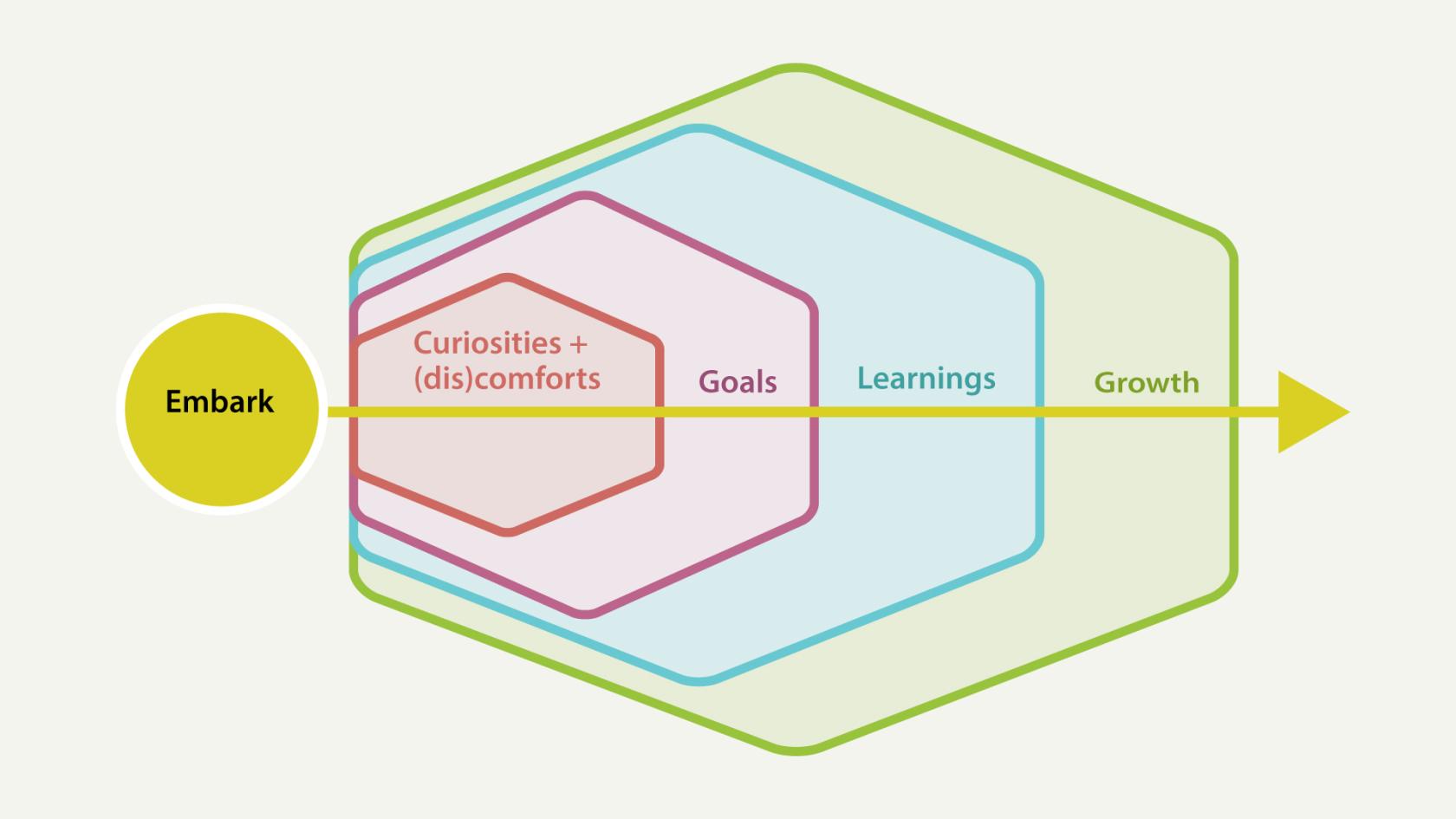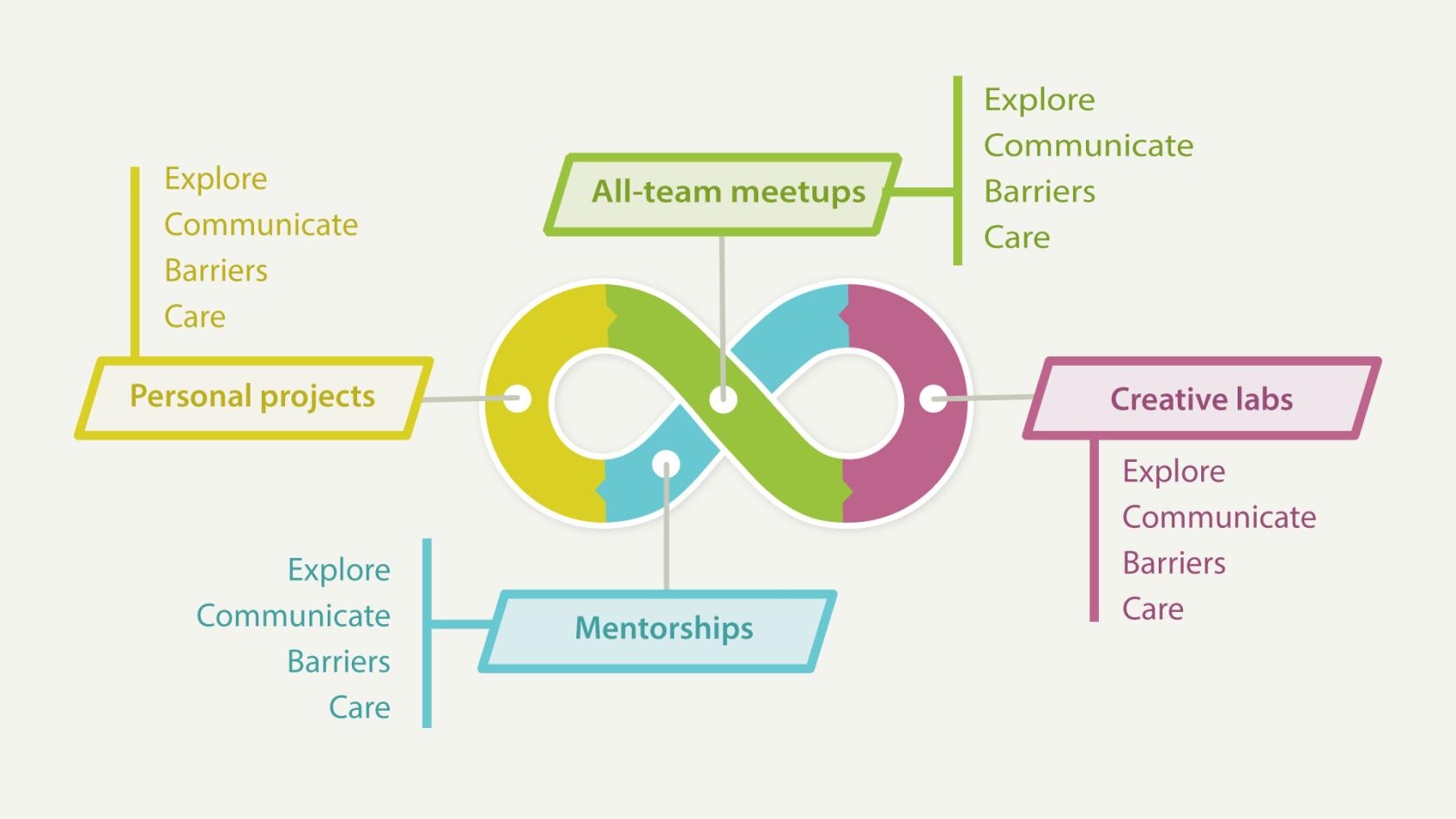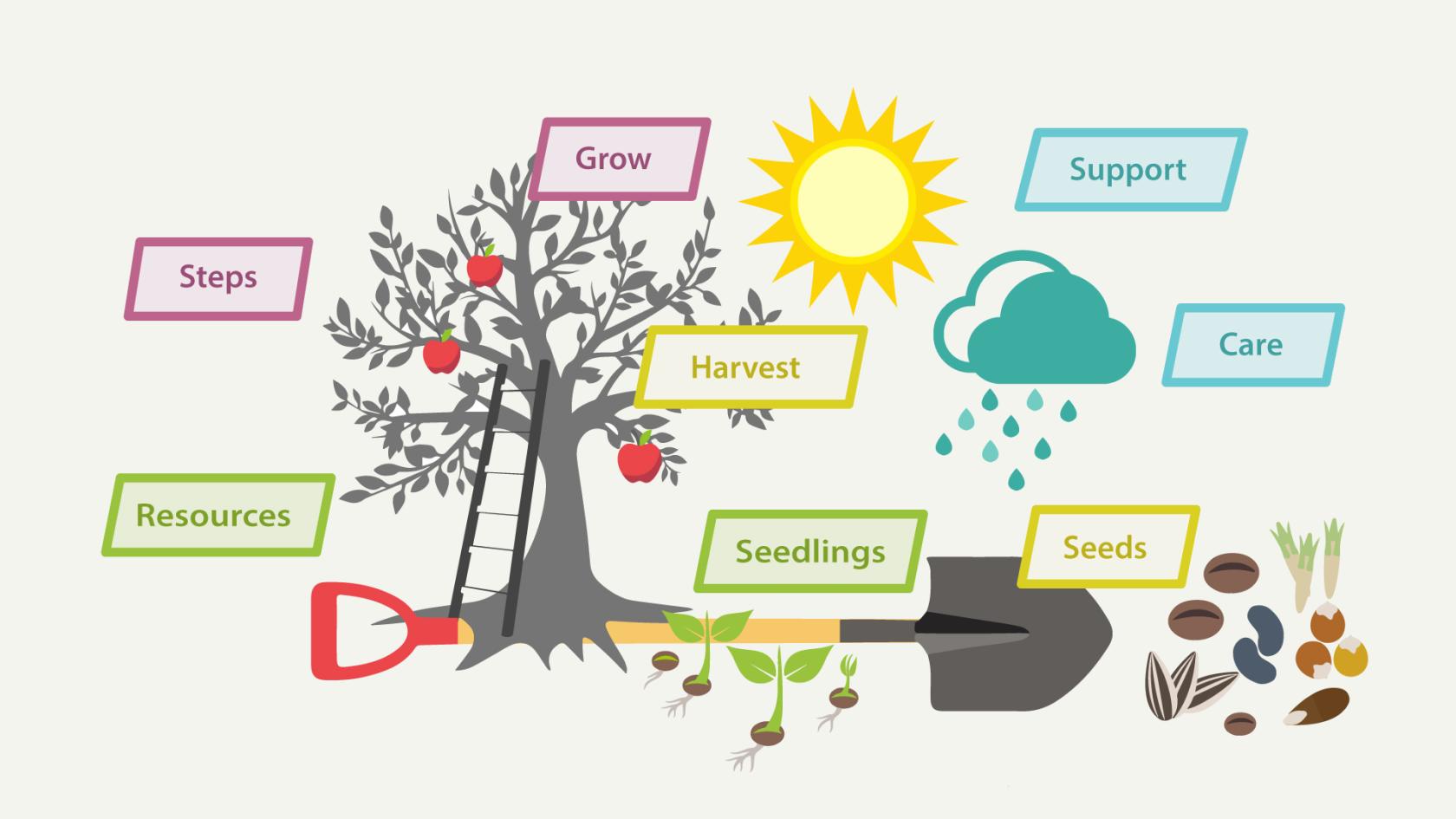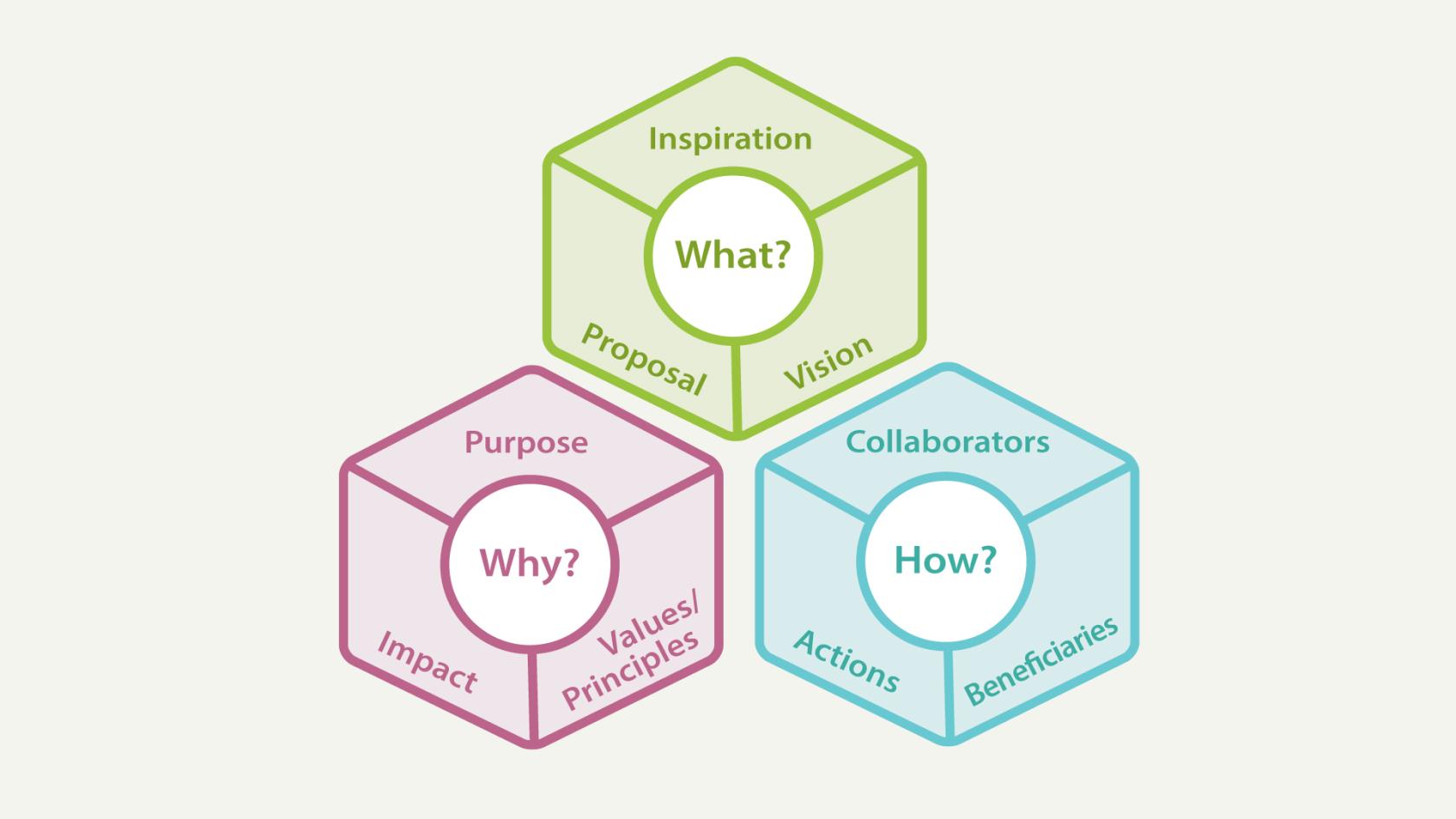Together Well
What is it?
ArtsPond's Together Well is a framework designed to guide groups in collaboratively addressing complex issues. It supports the creation of meaningful and equitable solutions through a process grounded in shared purpose, care, and collective intelligence.
Whether in the arts, culture, or other fields, the Together Well framework helps groups navigate the inherent challenges of collaboration by fostering a thoughtful and inclusive approach to working together. The framework's five interconnected stages are anchored in reflective and generative questions that deepen understanding, spark creativity, and sustain momentum. At each stage, the focus is on addressing the key elements of collaboration, including preparing, committing, harvesting, shaping, and impacting.
For example (with visual journey maps taken from ArtsPond's Together There residency on digital justice):
Preparing (grounding collaboration)
Guiding questions include:
Committing (building trust)
Creating clear roles, responsibilities, and channels for communication while fostering trust and mutual accountability.
Guiding questions include:
- How will we define roles and responsibilities to ensure clarity and accountability?
- What decision-making processes will help us navigate conflicts or differences of opinion?
- What communication methods will best suit our group’s needs and contexts?
- How can we establish agreements that reflect equity and inclusivity in our collaboration?
Harvesting (gathering insights)
Collecting and synthesizing diverse ideas, experiences, and knowledge to deepen collective understanding.
Guiding questions include:
- What diverse perspectives, experiences, or knowledge can we bring into the conversation?
- How can we create space for active listening and meaningful dialogue?
- What patterns or themes are emerging from our shared insights?
- How can we ensure that all voices in the group are valued and heard?
Shaping (co-creating solutions)
Using gathered insights to collaboratively develop innovative and practical approaches to address the issue at hand.
Guiding questions include:
- How can we synthesize our insights into actionable solutions?
- What creative tools or methodologies can help us innovate effectively?
- How will we test, iterate, and refine our ideas collaboratively?
- How can we ensure our solutions are practical, inclusive, and reflective of the group’s diversity?
Impacting (sustaining momentum)
Implementing solutions and ensuring long-term impact through ongoing care, reflection, and adaptation.
Guiding questions include:
- How will we measure the success or impact of our collaboration?
- What mechanisms can we put in place to ensure long-term sustainability and care?
- How will we celebrate our successes and reflect on areas for growth?
- What steps can we take to adapt and expand our work for future challenges?
How to use it?
To apply the Together Well framework in group collaboration:
Preparing (grounding collaboration)
- What: Begin by reflecting on shared goals, individual intentions, and potential challenges.
- How: Facilitate pre-project discussions or workshops to establish trust, explore curiosities, and address discomforts. Use these reflections to set the foundation for collaboration.
Committing (building trust)
- What: Define roles, responsibilities, and communication methods to ensure clarity and accountability.
- How: Create a collective agreement or charter outlining expectations, decision-making processes, and mechanisms for addressing conflicts or barriers.
Harvesting (gathering insights)
- What: Engage in active listening, brainstorming, and knowledge sharing to uncover diverse perspectives and insights.
- How: Use creative labs, knowledge-mapping sessions, or co-writing exercises to capture ideas and identify emerging patterns or themes.
Shaping (co-creating solutions)
- What: Work together to develop actionable and innovative solutions based on the group’s collective knowledge.
- How: Use collaborative design processes, such as prototyping or testing, to ensure the solutions are practical, inclusive, and reflective of group input.
Impacting (sustaining momentum)
- What: Implement the solutions and establish mechanisms for long-term impact.
- How: Reflect on the collaboration’s outcomes, celebrate successes, and create a plan for ongoing adaptation and care to sustain progress over time.
Examples in arts and culture
A collective of urban and rural artists comes together to address environmental sustainability in their creative practices. Using the Together Well framework, they aim to explore how art can contribute to environmental awareness and actionable change while navigating the challenges of bridging geographical and cultural divides.
-
Preparing
The group begins with virtual meetings to discuss their shared concerns about sustainability. They reflect on their motivations, set shared goals, and address initial discomforts, such as differing levels of access to resources between urban and rural members. -
Committing
They create a collective agreement that establishes clear communication protocols, including a mix of virtual and in-person meetings. Roles are assigned based on expertise, such as organizing workshops, documenting processes, or engaging with local communities. -
Harvesting
The group hosts brainstorming sessions and creative labs where members share personal experiences and knowledge about sustainable practices. They also gather input from their local communities, identifying common challenges and unique opportunities. -
Shaping
Using the insights gathered, the group co-creates a series of public art installations and workshops that address environmental themes, such as reducing waste and protecting biodiversity. They design the installations to be adaptable for both urban and rural contexts. -
Impacting
The collective launches their projects, engaging diverse audiences and sparking dialogue about sustainability. They establish a digital archive of their work and a mentorship program to inspire and guide other artists interested in environmental issues. Reflecting on their collaboration, they identify ways to expand their impact and ensure their practices remain adaptable and inclusive.





No Comments